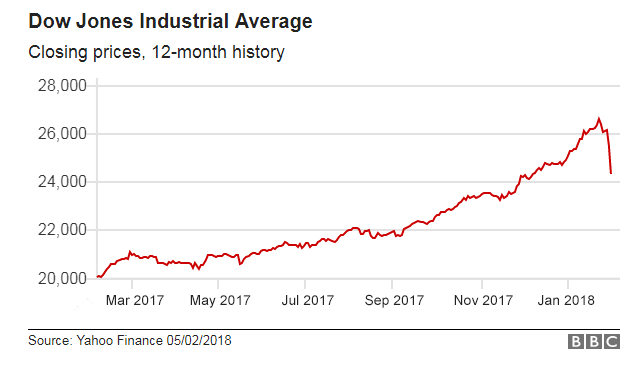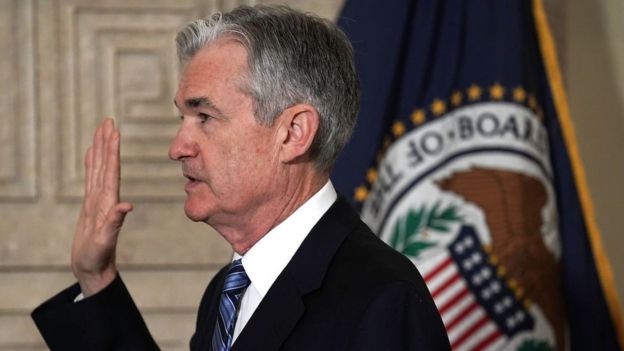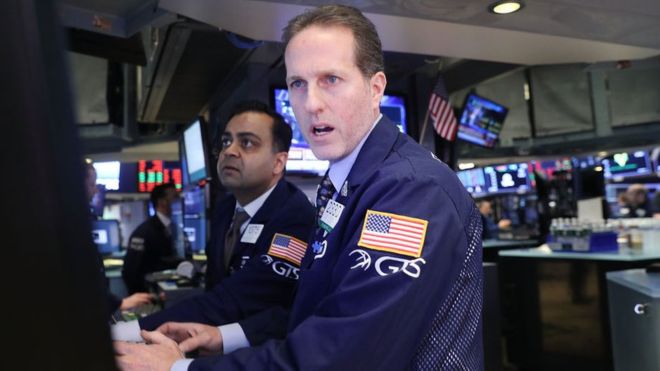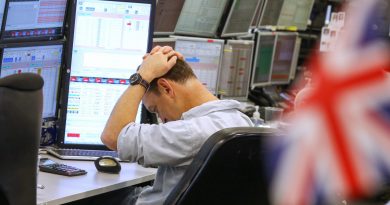Dow Jones stock index hit by record falls
The White House moved to reassure markets on Monday after the Dow Jones Industrial Average index dropped by 1,175 points.
The leading US stock market index closed down 4.6% at 24,345.75.
The White House said: “The President’s focus is on our long-term economic fundamentals, which remain exceptionally strong.”
The fall surpasses a previous record 777.68 points drop on the Dow Jones during the financial crisis in 2008.
That came after Congress rebuffed a $700bn bank bailout plan following the collapse of investment bank Lehman Brothers.
Monday’s decline is the largest fall in percentage terms for the Dow since August 2011, when markets dropped in the aftermath of “Black Monday” when Standard & Poor’s downgraded its credit rating of the US.
US investors are reacting to changes in the outlook for the American and global economy, and what that might mean for the cost of borrowing.
The stock market sell-off accelerated on Friday when the US Labour Department released employment numbers which showed stronger growth in wages than was anticipated.
If salaries rise, the expectation is that people will spend more and push inflation higher.
To keep that under control, America’s central bank will need to raise interest rates, which has spooked investors who were expecting the US Federal Reserve to increase rates only two or three times this year.
They now predict there may be a few more interest rate rises on the horizon.
The decline in the Dow was closely followed by the wider S&P 500 stock index, down 4.1% and the technology-heavy Nasdaq, down 3.7%.
In London, the FTSE 100 index of leading companies also fell to close down 1.46% or 108 points lower.
Monday’s sell-off was driven by firms moving to sell stocks to put more money into assets such as bonds which benefit from higher rates, says Erin Gibbs, portfolio manager for S&P Global Market Intelligence.
“This isn’t a collapse of the economy. This isn’t a concern that markets aren’t going to do well, or that corporate America isn’t going to do well,” she said.
“This is concern that the economy is actually doing much better than expected and so we need to re-evaluate.”

Stronger global growth has prompted central banks in Europe, Canada and elsewhere to ease away from policies put in place to stimulate the economy after the financial crisis.
On Monday, Jerome Powell was sworn in as the new chair of the US Federal Reserve.
The market declines, which spread globally, underscored the challenges he and other bankers face – to make decisions that sustain the growth of the economy without alarming investors.
What has driven the Dow’s surge?
President Donald Trump has tweeted a number of times about the increase in US stock markets since he was elected in November 2016, using the gains to illustrate market improvement.
On 7 January, he wrote: “The Stock Market has been creating tremendous benefits for our country in the form of not only Record Setting Stock Prices, but present and future Jobs, Jobs, Jobs. Seven TRILLION dollars of value created since our big election win!”
The Dow closed Monday having shed about a third of its gains since Mr Trump took office in January 2017.
Investors should be prepared for choppier stock markets in the months ahead, said Jason Draho, head of asset allocation for UBS Wealth Management Americas.
“The difference between this year and last year is we’re going to see more periods of volatility like this as the market reacts to higher inflation,” he said.
“We’re just not used to it because it’s been so long since we’ve had a significant correction.”
Investors have been bracing for a downturn after months of seemingly unstoppable gains.
Amid the market plunge on Monday, websites for several large money management companies suffered slowdowns or crashes.
Wall Street firms also said they have been fielding calls from people worried about their investments.
Analysis: By Anthony Zurcher, BBC North America reporter
 Image copyrightGETTY IMAGES
Image copyrightGETTY IMAGESBoasting about stock market gains is a dangerous game that most presidents avoid playing. Barack Obama did it occasionally, but only after the US economy had climbed significantly from the wreckage of the 2008 collapse.
After warning of a market bubble during the campaign, however, Donald Trump became the Dow Jones’s biggest cheerleader- in tweets, at rallies and even during last week’s State of the Union address. That set up the jarring visual of the president boasting about the benefits of his tax cuts in a speech as the markets headed south.
US cable news channels, which had been airing the president live, cut into their coverage to report on the record-setting day. It was a highly visible hiccup in the recent US economic success story that will be hard for most Americans to miss.
The president will make the case that the fundamentals in the economy are still strong. Wages are up and unemployment is down – possibly contributing to stock drop. If growth continues, this could be chalked up as yet another rhetorical mis-step by a non-politician.
If it’s the beginning of a larger correction in an election year, however, the president’s words could come back to haunt him.
The Dow’s dramatic fall marks a turnaround from January, when it raced past the 25,000 and 26,000 point milestones in less than a month.
Joel Prakken, chief US economist for IHS Markit, predicts share price gains will be limited over the next two years.
But he said markets would need to deteriorate more significantly for him to start to worry about the broader economy.
“We’re not entirely surprised,” he said. “We were looking for a period of somewhat disappointing returns on equities and not much movement in price.”




